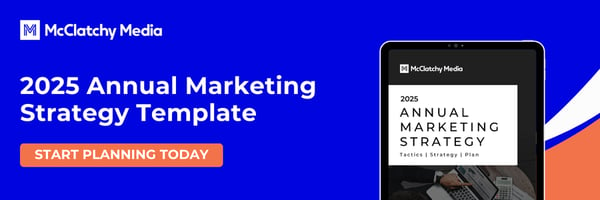It’s been just over two years since ChatGPT launched, and AI has become an everyday tool for many of us. From answering complex questions to writing entire documents, artificial intelligence is transforming how we do business—and marketing is no exception.
For marketing managers and business owners, knowing how to harness AI can push your business forward and give you a beneficial tool. But what exactly does the rise of AI in marketing mean for your business? And how can you start benefitting from it?
In this post, we’ll cover how AI is reshaping marketing and how you can implement it effectively to grow your business.
How AI Impacts the Marketing Industry
Before we explore the specific applications of AI tools, it’s important to understand how this technology impacts marketing. At its core, AI is about data—analyzing, sorting, and using it to make smarter decisions. Given the data-driven nature of marketing, it’s no wonder AI is making waves.
Here’s how AI can directly impact your marketing efforts.
1. Improved Targeting and Segmentation
AI's ability to analyze vast datasets outshines any manual method. It uses sophisticated algorithms to recognize patterns and sort your audience into highly specific groups that you can target with your marketing.
For instance, instead of just knowing your audience by broad demographics like "males aged 18 to 34," you can use AI to segment them into subgroups based on purchasing history, preferred social media platforms, and content consumption habits.
With better targeting, your campaigns can reach the right customers at the right time, significantly reducing wasted marketing spend and boosting ROI. Tools like Google Ads, Meta’s Audience Insights, and McClatchy’s Premium Audience Network already do much of this heavy lifting for marketers.
2. Automated Marketing Personalization
Customers now expect brands to understand their individual preferences and deliver tailored experiences. AI powers personalization tools in customer relationship management (CRM) platforms, email marketing, and digital advertising.
For example, AI makes it easy to automate email campaigns, such as inserting a customer’s name into the subject line, suggesting products based on browsing history, and timing promotional emails to reach inboxes when recipients are most likely to engage.
This kind of automated personalization leads to better customer experience, which increases engagement and ultimately drives more sales. Tools like HubSpot and Salesforce are already leveraging AI to make personalization seamless.
3. Efficient Content and Idea Generation
Writing compelling content takes time, and the brainstorming process can be even longer. This is where generative AI, like ChatGPT, comes into play. AI tools can help generate ideas for blog posts, ad copy, social media captions, and more.
While AI can't (and shouldn't) replace human creativity, it can act as an invaluable first step by providing drafts that marketers can refine with their unique voice and style to ensure it adheres to brand guidelines and matches your audience.
Time savings are a huge advantage here. AI lets you focus more on strategy and creativity rather than starting everything from scratch. Platforms that specialize in providing automated content outlines and drafts tailored to different niches handle the early structure and outlining so you can complete more tasks with less energy.
4. Accurate Predictive Analytics
AI is also revolutionizing predictive analytics. By analyzing historical data, AI can help you anticipate future outcomes, such as which marketing campaigns are likely to succeed, what content your audience will engage with, and even customer churn rates.
For example, AI tools can identify which customers are likely to stop engaging with your brand and suggest strategies to bring them back.
With better data-driven predictions, businesses can make smarter decisions, optimize budgets, and better prepare for market shifts.
5. Chatbots and Help Functions
AI-powered chatbots are now becoming a staple for businesses looking to improve customer support. Unlike basic automated responses, AI chatbots can understand natural language and learn from customer interactions.
These bots are excellent for FAQs, directing customers to the right information, and capturing leads in real-time. They can also assist in scheduling appointments or routing queries to human representatives when needed.
Chatbots save time, improve the customer experience, and ensure no query goes unanswered—even outside business hours. Additionally, they free up your human team to focus on higher-value interactions.
AI in Marketing Powers Efficiency, But Expertise Is Key
While AI offers many tools to enhance marketing efficiency, it’s essential to remember that it’s not a magic fix for all your marketing needs. AI excels at streamlining repetitive tasks and analyzing data, but it still requires creative input and strategic expertise to truly succeed.
This is where working with experienced marketing professionals can make all the difference. For example, a seasoned media partner like McClatchy uses AI tools and pairs them with deep industry knowledge to deliver highly effective campaigns.
Whether you’re creating your first AI-enhanced email campaign or looking to optimize a large-scale paid ad strategy, having experts who understand the technology—and your unique brand goals—will set you apart.
Take Your Marketing to the Next Level with McClatchy
McClatchy has decades of expertise in marketing and has helped pioneer the industry through multiple, transformative technological changes that preceded the rise of AI. They have a deep understanding of the marketing industry and rich audience insights through their Premium Audience Network to help connect you to the people who would make the most optimal customers.
Contact McClatchy today to learn how our marketing solutions and industry expertise can take your campaigns to the next level.






